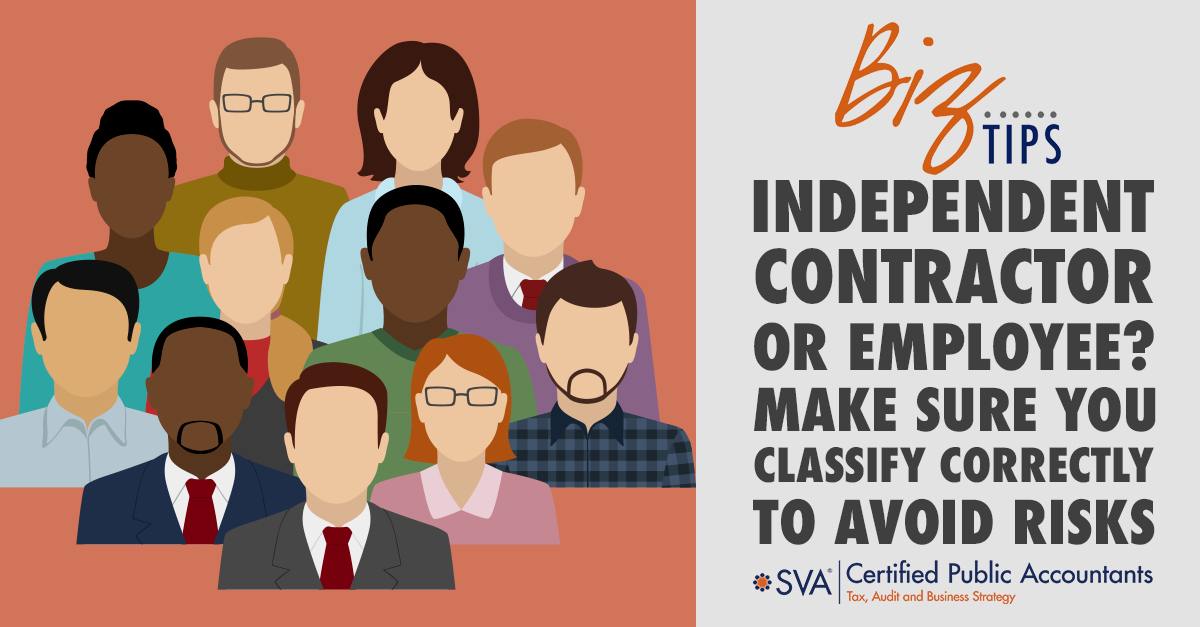Properly classifying individuals who perform services for your company is critical to avoid penalties and issues with the Department of Labor (DOL) and the Internal Revenue Service (IRS).
Misclassifying can land you in big trouble as the IRS has stringent definitions to determine which is the appropriate classification.
Independent Contractor vs. Employee
According to the IRS, the definition of an independent contractor or an employee depends on the relationship between the worker and the business. Generally, there are three categories to examine:
Behavioral Control
Does the company control, or have the right to control, what the worker does and how the worker does the job?
Financial Control
Does the business direct or control the financial and business aspects of the worker's job? Are the business aspects of the worker's job controlled by the payer? Examples are how the worker is paid, are expenses reimbursed, who provides tools/supplies, etc.
Relationship of the Parties
Are there written contracts or employee-type benefits (i.e., pension plan, insurance, vacation pay, etc.)? Will the relationship continue and is the work performed a key aspect of the business?
When hiring independent contractors, always have a written contract that outlines the specifics of the work expected and the timeframes. Long-term work or extended deadlines will bring into question if the individual should be an employee.
An agreement (or contract) between a business and an individual does not mean they are truly an independent contractor. They must meet the requirements of an independent contractor and the appropriate taxing authorities must agree that they meet the requirement.
How Can a Potential Issue be Brought up for Examination?
- An independent contractor applies for unemployment when they are no longer needed by your organization.
- An independent contractor receives a 1099 and a W-2 in the same year. Although there can be certain situations where this can occur, it can also be a red flag.
- An independent contractor submits a worker’s compensation claim. There are situations where independent contractors can be covered under a company’s worker’s compensation policy, however this will lead to a review of the facts.
Check out the Wisconsin nine-part test at: https://dwd.wisconsin.gov/worker-classification/wc/ninepart/
Red Flags Indicating You May Have an Issue
When working with your independent contractor, here are 5 things you need to avoid:
- Do not let your independent contractor use company equipment or work onsite unless the job absolutely requires it.
- Do not provide a company email, title, or invite them to employee meetings.
- Do not prohibit them from working with other companies or require full-time work for your company.
- Do not pay weekly, biweekly, or monthly – require invoices for payment of services.
- Do not give additional work after the project is completed without signing a new contract.
What Happens if a Misclassification Occurs?
An employer is required to withhold and pay income taxes, Social Security, Medicare, and unemployment taxes for each worker. If it is deemed that the individual is an employee, the underpayment of these taxes can result in large balances due as well as penalties from the IRS.
Do Your Due Diligence
If you have independent contractors, consult with an outside advisor to have them review your contracts. Taking the time for a review could save you significant dollars in the future. Better safe than sorry!

© 2022 SVA Certified Public Accountants

